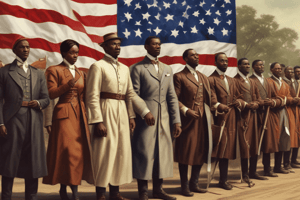Podcast
Questions and Answers
What factor made black farmers in Mississippi particularly vulnerable during the Great Depression?
What factor made black farmers in Mississippi particularly vulnerable during the Great Depression?
- Equal opportunities in the market
- Owning larger farms compared to white farmers
- Reliance on sharecropping and owning smaller farms (correct)
- Access to agricultural loan programs
What was one key impact of racial tensions on social structure in rural Mississippi during the Great Depression?
What was one key impact of racial tensions on social structure in rural Mississippi during the Great Depression?
- Violence and intimidation tactics enforcing Jim Crow laws (correct)
- Increase in cross-racial collaboration
- Promotion of racial equality advocacy
- Decrease in white supremacy group influence
Why did many African Americans in Mississippi continue seeking work through federal relief programs despite facing frustration and discontent?
Why did many African Americans in Mississippi continue seeking work through federal relief programs despite facing frustration and discontent?
- They had alternative reliable sources of income
- They were not affected by economic hardships
- They had equal access to agricultural loan programs
- Out of desperation due to extreme poverty (correct)
What was the consequence of denying African Americans financial resources necessary for land development or maintenance?
What was the consequence of denying African Americans financial resources necessary for land development or maintenance?
How did the systematic exclusion of African Americans from federal relief programs impact their situation during the Great Depression?
How did the systematic exclusion of African Americans from federal relief programs impact their situation during the Great Depression?
Study Notes
Rural Setting in Mississippi During the Great Depression: Racial Tensions
The rural setting of Mississippi during the Great Depression was characterized by significant racial tensions, which exacerbated existing societal issues. This period saw increased segregation and discrimination against African Americans, who were already disadvantaged due to systemic racism.
Segregation in Mississippi Schools
Mississippi schools during the Great Depression enforced strict segregation policies. A survey conducted between 1937 and 1938 found that there were 896 schools with all black students at the elementary level and 571 at the secondary level. In contrast, only three schools had more than 20% white students. These statistics highlight the stark division between races in Mississippi's education system.
Impact of Federal Relief Programs
Federal relief programs such as the Civilian Conservation Corps (CCC) and the Works Progress Administration (WPA) did little to alleviate racial tensions in Mississippi's rural areas. While these programs offered temporary employment opportunities, they also reinforced the second-class status of African Americans, who made up over half of the state's population.
In WPA camps, African American workers faced discriminatory practices, including separate housing and restricted access to training. Similarly, in CCC camps, African Americans were often relegated to manual labor positions while their white counterparts received better jobs. Despite these challenges, many African Americans continued to seek work through these programs out of desperation, leading to further frustration and discontent within the community.
Economic Hardships and Discrimination
During the Great Depression, African Americans in Mississippi faced extreme poverty and economic hardship. Black farmers were particularly affected, as they typically owned smaller farms and relied heavily on sharecropping, making them more vulnerable to market fluctuations.
Additionally, agricultural loan programs favored white farmers, denying African Americans the financial resources necessary to develop or maintain their land. As a result, many black families were forced into tenant farming or migrated from rural areas in search of employment opportunities, adding to the socioeconomic divide.
Impact on Social Structure
Racial tensions in Mississippi's rural settings deeply impacted the social structure during the Great Depression. White supremacy groups gained influence, using violence and intimidation tactics to enforce Jim Crow laws and preserve segregation. This fostered an environment where racial hostility persisted, even amidst widespread suffering caused by the economic downturn.
Conclusion - Continued Struggle for Equality
Throughout the Great Depression, the rural setting of Mississippi remained a hotbed of racial tension and discrimination. The systematic exclusion of African Americans from federal relief programs, coupled with ongoing segregation and unequal treatment, worsened the already precarious situation for this marginalized group. However, it is essential to remember that despite these challenging circumstances, the struggle for equality and civil rights continued, ultimately paving the way for progress and change in the decades following the Great Depression.
Studying That Suits You
Use AI to generate personalized quizzes and flashcards to suit your learning preferences.
Description
Test your knowledge on the racial tensions and discrimination faced by African Americans in rural Mississippi during the Great Depression. Explore topics such as segregation in schools, impact of federal relief programs, economic hardships, and social structure challenges.



